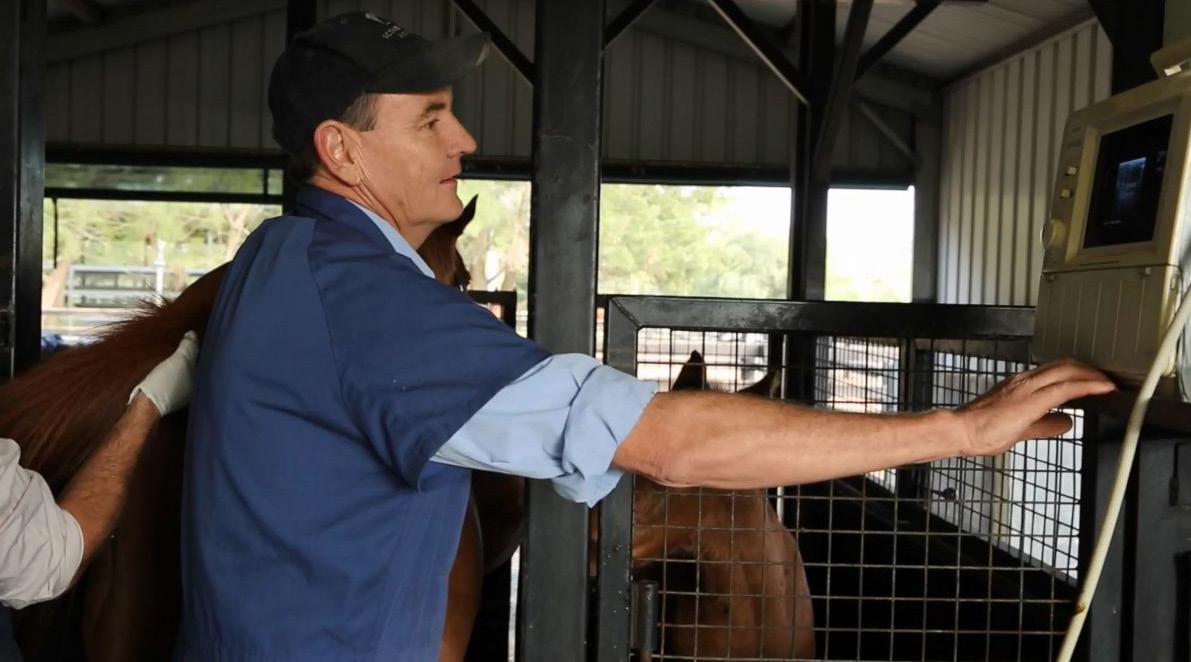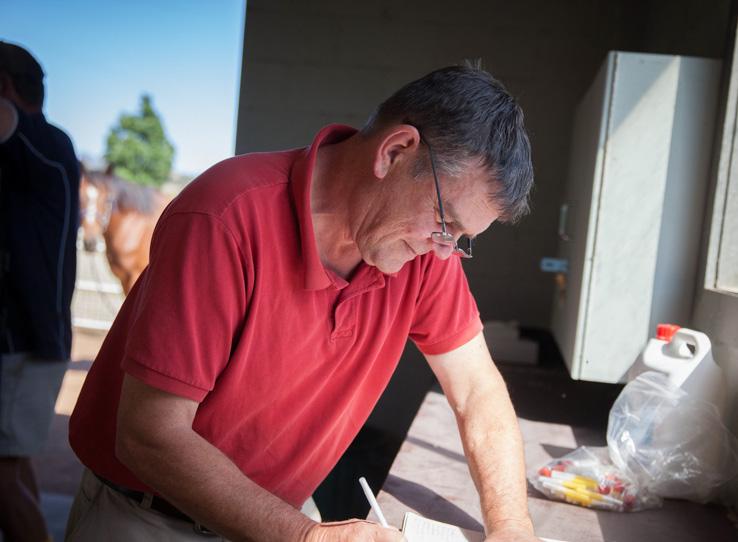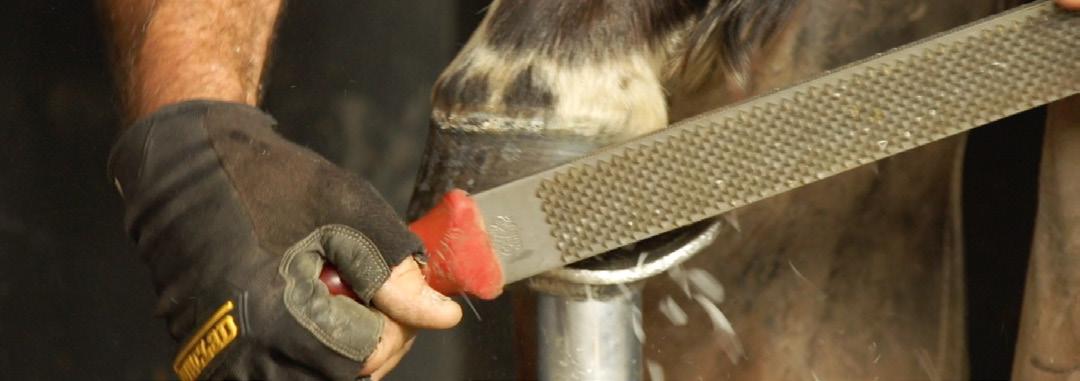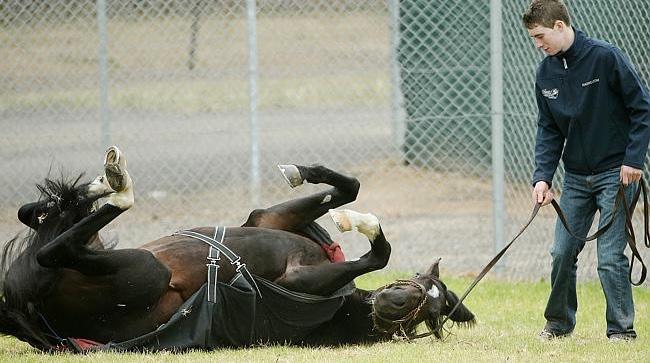
7 minute read
Equine Specialists
Equine Veterinarian Vet Nurse Equine Laboratory Technician (Pathology) Veterinary Assistant Equine Nutritionist Equine Dentist Equine Podiatrist Equine Physiotherapist Equine Naturopath Farrier
Equine Veterinarians are licensed health professionals who provide vaccinations, treat injuries, diagnose, prescribe medications, treat diseases and perform surgery on horses. Veterinarians are often consulted on topics such as diet, stabling, improving performance, breeding and often working in conjunction with a farrier care about the health and welfare of animals, it may be
to correct angular limb deformities, solve lameness issues, and ensure that the foot is properly balanced.
The thoroughbred industry duties include performing pre-purchase exams, monitoring the reproductive health of breeding stallions and broodmares, assisting with foalings, and taking x-rays or ultrasounds.
It is common for equine veterinarians to work a five to six-day week with additional “on call” emergency hours as needed. Work may occur outdoors in varying temperatures and weather conditions. A veterinary science degree takes around five or six years of study, depending on the university. Australia has several universities offering undergraduate veterinary science courses. It’s a good idea to contact the university
Equine Veterinarian
requirements and the marks you will need. For mature students who are thinking of changing careers, bear in mind that there may be limited places available so contact the university to find out about any entrance opportunities. A veterinary science course can be demanding, but if you’re highly motivated, have an interest in science and you’d like to attend to get more information on course
the course for you.

Equine Vet Nurse
An equine nurse plays a role in all aspects of equine veterinary care, including medicine, surgery, intensive care, breeding and anaesthesia. Equine nurses are often involved in clinical pathological and radiological procedures. Veterinary nurses are employed on a stud farm to assist veterinarians in rehabilitating horses with injuries or illness. They are also very often largely involved in the delivery of foals and hence many vet nurses are employed as ‘Night Watch’ workers during the foaling season. Quite often, veterinary nurses will be employed as stud grooms but will hold additional responsibilities. This role like that of any Equine Specialist can be physically and emotionally challenging, but yet rewarding. There are several study courses you can take to get your Equine Nursing career started.
Daily tasks may include:
• Foaling down of mares. • Assist with Veterinary procedures and surgeries. • Cleaning and maintaining of the equine facility, and implementing quality assurance methods and OHS procedures. • Maintain and monitor horse health and welfare records. • Participate in workplace communications and administration. • Feed and water animals. • Assist in health care of animals, including administering medications prescribed by Veterinarians. • Manage Quarantine practices and procedures. • Comply with infection control policies and procedures in animal work.

Equine Laboratory Technician
The veterinary laboratory analyses specimens (blood, fluids and tissues) and provides information that the veterinarian can use to diagnose, treat and monitor a horse’s health or disease status. Veterinary pathology covers a wide range of areas including haematology (looking at blood cells), biochemistry (measuring levels of enzymes, proteins and electrolytes), microbiology (bacteria, fungi, viruses, parasites) and histopathology (microscopic examination of tissues). Molecular technologies such as PCR are also now being widely utilised in veterinary laboratories as a diagnostic tool. There are a number of pathways into the laboratory. Veterinary nurses may perform pathology tests as part of their role or samples may be sent to a more specialised veterinary laboratory. Staff in these labs have usually undertaken study through vocational education providers such as TAFE or completed university degrees in laboratory science or equine studies. A veterinary pathologist is a veterinarian who has completed further studies in pathology. Research opportunities are also available.
Equine Veterinary Assistant
Another important member of the equine world, often vet assistants are working their way through medical school and will someday become a veterinarian themselves. They handle the more basic tasks and often accompany the vet on farm visits.
Daily tasks may include:
• Assisting with Veterinary procedures • Ensuring sanitary conditions are adhered to in all areas, cleaning barn areas and monitoring stock supplies. • Checking all paperwork for admissions and treatments are in order, filing and confirming lab results have been received for the Vets.

Equine Nutritionist
An equine nutritionist specializes in the health, diet and feeding behaviours of horses. This professional may be either an animal scientist or a veterinarian who has special training in large animal or equine physiology, disease and nutrition.

Many individuals in this field have Bachelor’s degrees in equine studies or animal science as well as advanced degrees. Veterinarians must hold doctoral degrees in veterinary medicine and be licensed. Most animal scientists have earned doctoral degrees, and those specialising in equine nutrition focus their studies and research in that area. In addition to large animal veterinary practice, equine nutritionists can work at universities and animal feed manufacturing companies, among other options.
Equine Dentist
Professional specialist dental care is required as part of regular horse maintenance and nutrition management. Oral and dental health can have a significant impact on a horse’s wellbeing, performance and lifespan. This care requires high level of skills and knowledge in a variety of dental aspects. To become an Equine Dentist, you will need to complete a Certificate in Equine Dentistry. Many Veterinarians will specialise in Equine Dentistry. Veterinarians with a particular interest and training in dentistry perform regular assessments and routine procedures on patients’ teeth. They also have the skills and equipment required for the advanced procedures
involved in treating oral and dental diseases and injuries.

Equine Podiatrist
An Equine Podiatrist may start out as a Farrier or Veterinarian and combine the knowledge of these two parallel skills, concentrating on lameness issues and developing treatment management plans for foot problems. Research interests include the biomechanics of therapeutic horse shoes, hoof and limb conformation of thoroughbred foals to yearlings and laminitis in broodmares. Working closely with a team of Veterinarians, Farriers and specialist Equine Surgeons this role like many other specialist roles in the Equine Veterinary field takes University studies, passion and dedication to the specific fields of practice.
Footnote: Please visit www.sconeequinehospital.com.au for information on specialists in the veterinary fields

Equine Physiotherapist

The principles of equine physiotherapy are no different to those in the human world - addressing movement dysfunction, muscle imbalances, gait abnormalities, restricted range of motion and adaptive changes in soft tissues and joints. An equine physiotherapist must first be a qualified human physiotherapist, who has then undertaken further post-graduate study in the treatment of animals. In NSW, it is a requirement that all animal physiotherapists work under vet referral. Physiotherapists work closely not only with the vet, but also your Farrier, Dentist and other healthcare professionals, ensuring a full team approach in addressing a horse’s injury or dysfunction.
Equine Naturopath
The primary role of this job is to facilitate optimal health, wellbeing and performance in the equine individual, using a holistic assessment and treatment approach. After completing a thorough assessment of the horse, a treatment plan is developed which involves dietary and management advice; and in many cases the use of western herbal medicine, nutraceutical supplementation and other therapeutic modalities such as homeopathy.

As an equine naturopath, you would treat and manage a broad spectrum of current health conditions, in addition to employing preventative health measures. Working in conjunction with veterinarians and other equine health care practitioners where appropriate.
Farrier
A Farrier is responsible for the shoeing of horses and work across racing stables, stud farms and large equestrian establishments. Most trainers and stud farms will only use a farrier that is qualified. Farriers are mainly self-employed; however, some race clubs, larger stables and stud farms also employ farriers.
Specialised in their field of the hoof and foot a farrier may work in correcting the confirmation of foals and horses and will often consult or work alongside Equine Specialists such as Veterinarians, Podiatrists and Physiotherapists ensuring the best practice is followed to in maintain the soundness of the horse.










